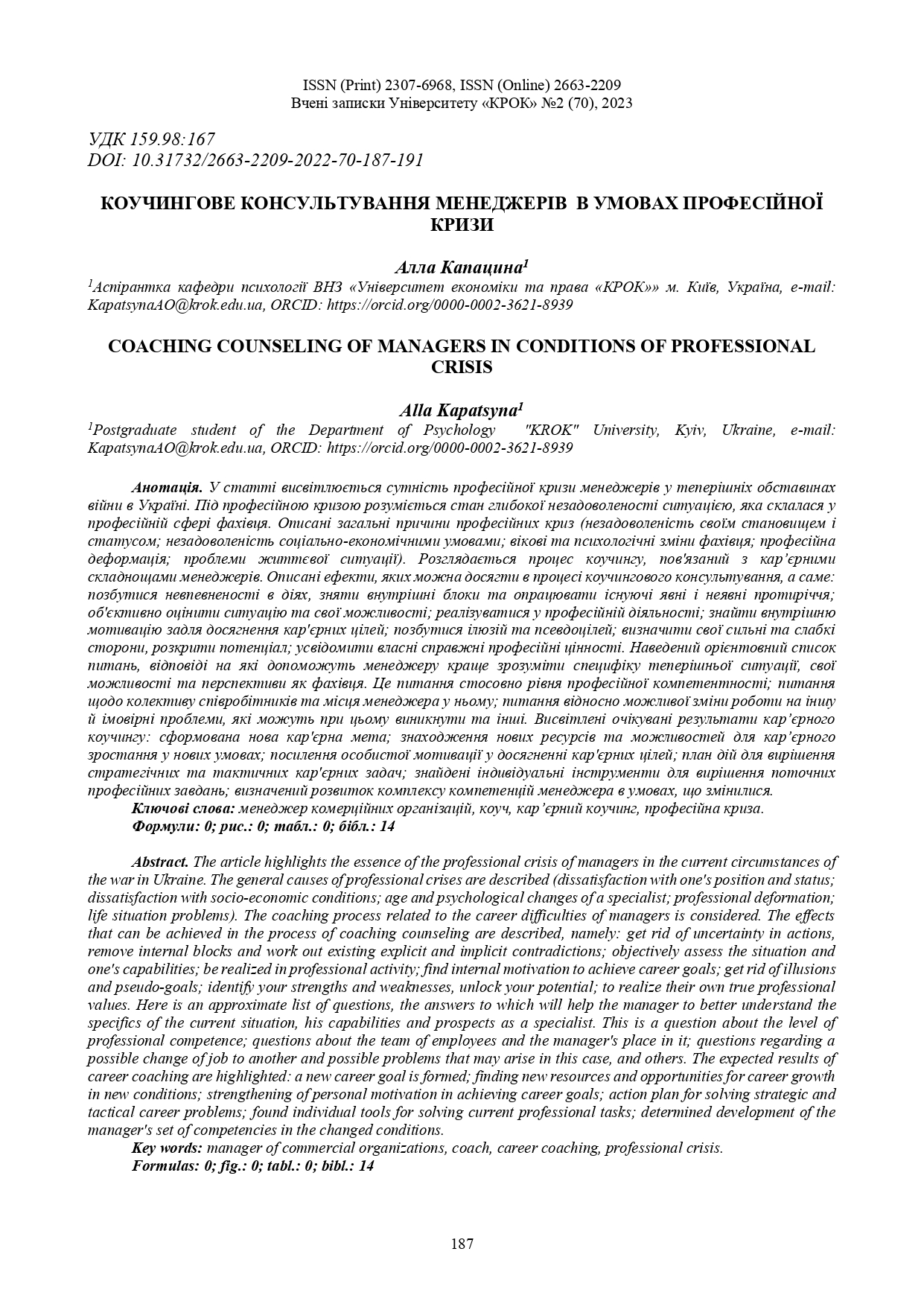COACHING COUNSELING OF MANAGERS IN CONDITIONS OF PROFESSIONAL CRISIS
DOI:
https://doi.org/10.31732/2663-2209-2022-70-187-191Keywords:
manager of commercial organizations, coach, career coaching, professional crisisAbstract
The article highlights the essence of the professional crisis of managers in the current circumstances of the war in Ukraine. The general causes of professional crises are described (dissatisfaction with one's position and status; dissatisfaction with socio-economic conditions; age and psychological changes of a specialist; professional deformation; life situation problems). The coaching process related to the career difficulties of managers is considered. The effects that can be achieved in the process of coaching counseling are described, namely: get rid of uncertainty in actions, remove internal blocks and work out existing explicit and implicit contradictions; objectively assess the situation and one's capabilities; be realized in professional activity; find internal motivation to achieve career goals; get rid of illusions and pseudo-goals; identify your strengths and weaknesses, unlock your potential; to realize their own true professional values. Here is an approximate list of questions, the answers to which will help the manager to better understand the specifics of the current situation, his capabilities and prospects as a specialist. This is a question about the level of professional competence; questions about the team of employees and the manager's place in it; questions regarding a possible change of job to another and possible problems that may arise in this case, and others. The expected results of career coaching are highlighted: a new career goal is formed; finding new resources and opportunities for career growth in new conditions; strengthening of personal motivation in achieving career goals; action plan for solving strategic and tactical career problems; found individual tools for solving current professional tasks; determined development of the manager's set of competencies in the changed conditions.
Downloads
References
Гаврілець І.Г. Психофізіологія людини в екстремальних ситуаціях: навч. посібник. Київ : ЗАТ «Віпол», 2006. С.76–85.
Титаренко Т. Життєві кризи: технологія консультування. К. : Главник, 2007. 120 с.
Шапар В. Сучасний тлумачний психологічний словник. Харків : «Прапор», 2007. 640 с.
Ochberg, F., Soskis, D. A, (Eds.) (1982), Victims of terrorism. Boulder: Westview Press, 320 p.
Palmer St., McMahon G.(1997), Handbook of counselling. London, Routledge, 246 p.
Rosenhan, D. L., Seligman, M. (1989), Abnormal Psychology. New York : W. W. Norton and Company, 378 p.
Weiss, D. S.(1993), Psychological processes in traumatic stress. Journal of Social Behavior and Personality, vol. 8, рр.3–28.
Вітмор Д. Ефективний коучинг. Київ : КМ-Букс, 2019. 336 с.
Нежинська О., Тименко В. Основи коучингу. Київ ; Харків : ТОВ «ДІСА ПЛЮС», 2017. 220 с.
Cywińska, Anna, Sylwia, Majewska, Kamila, Pępiak-Kowalska, Eliza, Szwec (2013), Coaching. Lublin, 190 р.
Starr, Julie (2017), Brilliant Coaching: How to be a brilliant coach in your workplace . United Kingdom, Publisher : Pearson Business, 240 р.
Canfield, Jack, Chee, Peter, Przełożyła, Bożena Jóźwiak (2014), Coaching dla zwycięzców. Sprawdzone techniki urzeczywistniania marzeń i osiągania trudnych celów. Poznań : Dom Wydawniczy REBIS, 296 р.
Сингаївська І.В. Розвиток психологічної компетентності керівника сучасної освітньої установи. Персонал, №1(55). К. : МАУП, 2000. С. 47–50.
Сингаївська І. В., Федорець С. Б. Психологічний аналіз поняття менеджменту та стилів управління. Правничий вісник Університету «КРОК». К. : Вищий навчальний заклад «Університет економіки та права «КРОК». Вип. 29. 2017. С. 197–205.

Downloads
Published
How to Cite
Issue
Section
License

This work is licensed under a Creative Commons Attribution-NonCommercial 4.0 International License.

